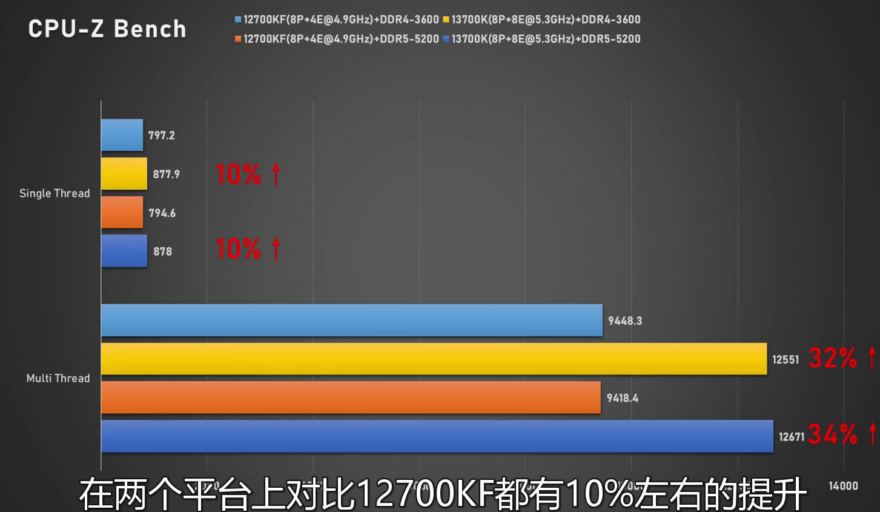Intel i7-13700K and i5-13600K Benched on CPU-Z
Edgard Poitou / 2 years ago

The Chinese hardware reviewer ExtremePlayer recently acquired a sample of Intel 13th gen Core CPUs which are reviewing in Bilibili videos. They just tested the Core i7-13700K 16-core and the Core i5-13600K 14-cores upcoming Intel 13th gen Core processors. The Intel Core 13th gen is based on a hybrid configuration with both performance cores on the “Raptor Cove” architecture and efficient cores using the “Gracemont” architecture.
The most noticeable upgrade on this 13th generation over the “Alder Lake” 12th generation is the increase in count of efficient cores for every processor of the lineup, which doubles from 4 to 8 in total, as well as the instruction cache, also being increased, the L2 cache being doubled on both of these processors. This is of course on top of more classic generation-to-generation improvements, and both processors rock slightly higher max boost clock speeds, around +5/+8%, and a better memory controller supporting faster DDR5 RAM speeds out of the box.
i7-13700K and i5-13600K
ExtremePlayer in their review compared the two processors on a ASRock Steel Legend Z690 motherboard, with two different memory kits since the RaptorLake CPUs still support both DDR4 and DDR5 like the AlderLake architecture did.
This comparison in 4 different configurations with two memory kits and the two CPU generations shows a ~10% increase generation-to-generation in single core performance. If you account for the clock speed difference, this is equivalent to an IPC improvement ranging from 2 to 3%. Both processors have almost equal performance when using DDR5 over DDR4 and this is well within the margin of error. This is perfectly expected as DDR5 is still in its very early stages, and the CPU-Z benchmark that has been chosen here for the comparison is not memory-intensive. There is however a much more interesting thing happening in multi-threaded workloads, and the extra efficient cores make a big difference for a gap of almost 35%.
The 13600K over the 12600K comparison pictures a very similar story, and we can see a +5% improvement in single core that also seem to confirm the IPC improvement of 2%. The multi-threading performance gap is getting even wider, at +40% this time. This larger difference is explained by the lower P-cores count but the same count of E-cores as the 13700K.
This performance improvement in both cases is however made at the cost of a much higher power consumption, which reaches 244W on the i7-13700K and 188W on the 13600K. This is a 20 to 30% increase over their previous generation counterparts, respectively at 188 and 148W in the same test.

We must stay aware that this review has been based on engineering sample processors that do not always reach clock speeds as high as the production samples but they should be almost identical or at least very close to it. The performance comparison is also based on a single CPU-Z benchmark, when all benchmarks offer slightly different results and this is the reason why we at eTeknix.com prefer to cross multiple benchmark results to get a better view of the full picture. Stay tuned for our review!



















